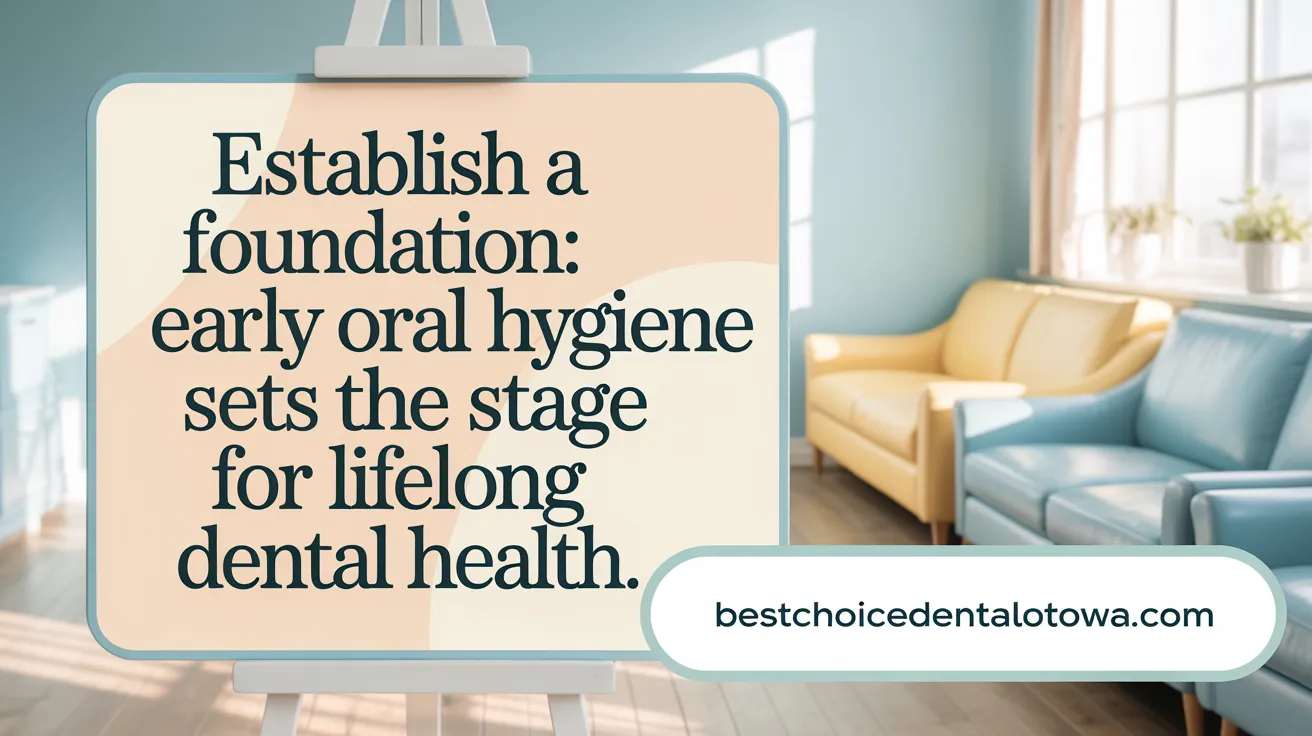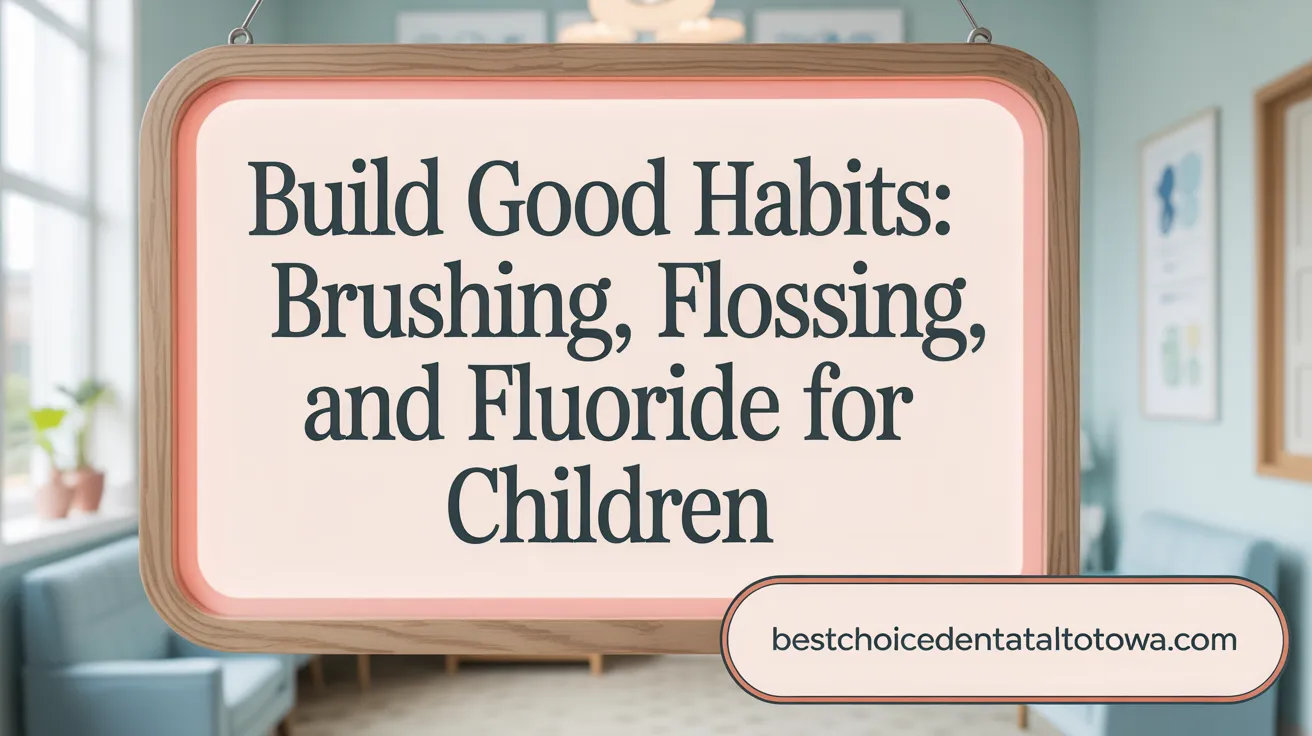Why Early and Preventive Dental Care Matters
Protecting a child’s smile starts long before the first tooth erupts. Establishing solid dental habits early on is crucial in preventing cavities, promoting healthy development, and reducing anxiety around dental visits. Pediatric dentistry is uniquely equipped to address the specialized needs of infants, children, and adolescents, ensuring oral health contributes positively to overall well-being.
Starting Oral Care Before the First Tooth Appears

Importance of early oral hygiene
Establishing good dental habits early is essential to promote lifelong dental health. Cleaning gums before teeth erupt helps remove bacteria buildup, which can reduce the risk of early childhood cavities and ensures the baby's mouth stays healthy. Early care also establishes a foundation for easier brushing once teeth appear and familiarizes infants with oral care routines.
Techniques for cleaning infant gums
Before teeth emerge, parents should gently clean the infant's gums twice daily using a soft, damp washcloth or a gauze pad. This practice helps eliminate bacteria and food residues that accumulate in the mouth. Starting early with this simple action encourages comfortable and stress-free oral care experiences for both child and parent.
First dental visit timing
The American Academy of Pediatric Dentistry and the American Dental Association recommendations recommend that a child’s first dental visit occur by age one or within six months of the eruption of the first tooth. This early visit allows the dentist to check for potential issues, offer guidance tailored to the infant’s needs, and begin preventive care like fluoride treatments if appropriate. Establishing a dental home early reduces anxiety and fosters positive attitudes towards dental care as the child grows.
Daily Dental Habits: Brushing, Flossing, and Fluoride Use

Age-appropriate brushing techniques
Good dental hygiene should start as soon as your child's first tooth appears. For infants, parents can begin with gentle gum cleaning using a soft, damp cloth before teeth emerge (Cleaning gums before teeth erupt). Once teeth have erupted, brushing should be done twice daily (Brushing twice a day with fluoride toothpaste).
For children under the age of three, brushing should be done with assistance, using a small, soft-bristled toothbrush (Tips from professional pediatric dentists). The recommended toothpaste amount is a smear roughly the size of a grain of rice to minimize fluoride ingestion (Fluoride toothpaste guidelines for children. From age three and onwards, children should brush twice a day with a pea-sized amount of fluoride toothpaste, learning proper techniques such as gentle, circular motions covering all surfaces of the teeth (Oral Health Tips for Children).
Fluoride toothpaste amounts
Fluoride plays a crucial role in strengthening tooth enamel and preventing cavities (Benefits of fluoride for teeth. For children below three years, a smear of fluoride toothpaste is sufficient (Proper fluoride toothpaste use. This small amount helps protect baby's teeth while limiting fluoride ingestion (Fluoride Toothpaste Guidelines). At age three and above, a pea-sized amount of fluoride toothpaste is recommended to effectively clean teeth and defend against decay (Daily brushing with fluoride toothpaste.
Starting flossing when teeth touch
Flossing is an essential part of dental care, helping remove plaque and food particles between teeth where toothbrushes can't reach (When to start flossing children’s teeth. Parents should introduce flossing as soon as two teeth begin to touch, which can be in early childhood (Child-Friendly Flossers). Using child-friendly flossers or gentle flossing techniques helps foster this habit (Daily flossing habits.
Supervision recommendations
Children under the age of six should be supervised while brushing to ensure they use the correct amount of toothpaste and to teach proper brushing and flossing techniques (Supervising young children's brushing. Around age six to eight, many children develop the manual dexterity to brush and floss independently but still benefit from parental oversight and encouragement to maintain consistent oral hygiene (Parents' role in children's oral health.
Establishing these daily dental habits early, with appropriate brushing, flossing, and fluoride use under supervision, sets the foundation for lifelong oral health and helps prevent common childhood dental problems like cavities and gum disease (Preventing cavities in children).
Preventive and Professional Pediatric Dental Care

Why Are Regular Dental Check-Ups Important for Children?
Regular dental check-ups are essential in pediatric dental care as they allow for the early detection and prevention of oral health problems. Children are advised to visit a dentist by their first birthday or within six months after their first tooth erupts. During these visits, professionals conduct thorough exams, cleanings, and assessments tailored to each child's oral development stage. Regular visits also help children become comfortable with dental settings, reducing anxiety. For more on importance of regular dental check-ups and what to expect during children's dental visits.
How Do Fluoride Treatments and Dental Sealants Help Protect Teeth?
Fluoride treatments strengthen tooth enamel, making it more resistant to decay. Fluoride can be applied professionally as varnishes during dental visits and is also present in water and toothpaste. For detailed information on benefits of fluoride for teeth and fluoride toothpaste guidelines for children. Dental sealants are protective coatings applied to the chewing surfaces of back teeth, preventing cavities by sealing grooves where food particles and bacteria can accumulate. These sealants can reduce the risk of cavities by up to 80%, as explained in resources about dental sealants for cavity prevention and preventing cavities with sealants.
How Is Early Detection of Decay and Developmental Issues Managed?
Pediatric dentists specialize in identifying early signs of tooth decay, misalignments, and other developmental concerns. Prompt detection allows for minimally invasive treatments, preventing progression and potential complications. X-rays may be used as needed to monitor tooth eruption and identify hidden decay. Early interventions promote better oral health outcomes and ease future dental procedures. Learn more about early detection and treatment of dental issues and pediatric dental procedures.
What Is the Role of Pediatric Dentists in Children's Oral Health?
Pediatric dentists undergo specialized training focused on the unique needs of infants, children, and adolescents. They provide age-appropriate care, including preventive treatments like fluoride and sealants, restorative procedures, and guidance on proper oral hygiene. These specialists also manage dental issues related to growth, special needs, and behavioral challenges, ensuring comprehensive care in a comfortable environment. For further insights, see the importance of pediatric dentists and pediatric dentistry overview.
Nutrition, Habits, and Lifestyle for Healthy Teeth
How Does Diet Impact Dental Health in Children?
A nutritious diet plays a crucial role in maintaining strong, healthy teeth in children. Foods rich in calcium, phosphorus, and vitamins strengthen enamel, the protective layer of teeth. Fresh fruits, vegetables, dairy products like yogurt and cheese, and leafy greens support oral health by providing essential nutrients. Adequate hydration with water not only promotes overall health but also stimulates saliva production which helps wash away food particles and neutralize harmful acids (Tips to Keep Your Child's Smile Healthy, Protecting Your Child's Smile on the Field, Top 5 Tips for Maintaining Your Child's Oral Health).
Why Limit Sugary Snacks and Beverages?
Sugary foods and drinks contribute significantly to the development of cavities by feeding harmful bacteria that produce acids attacking tooth enamel. Limiting snacks like candies, gummies, and sugary soda reduces the risk of tooth decay. Instead, offering healthier alternatives such as nuts, fruits, cheese, and yogurt can satisfy hunger without harming teeth. Choosing water or unsweetened beverages over sugar-laden drinks during meals and sports activities helps maintain a balanced oral environment (Oral Health Tips for Children, Children's Dental Health Month, Protect Your Kids Teeth After Halloween).
Why Should Bedtime Bottles with Sugary Liquids Be Avoided?
Putting children to bed with bottles or sippy cups filled with milk, juice, or any sugary liquid can lead to "baby bottle tooth decay." During sleep, saliva flow decreases, reducing natural cleansing, thus allowing sugars to remain on teeth longer and cause decay. Replacing sugary bedtime liquids with plain water or eliminating bottles before sleep helps prevent cavities and supports healthy developing teeth (Establishing Good Dental Habits Early, Pediatric dental care importance, Preventing cavities in young children).
What Are the Benefits of a Smoke-Free Environment for Children's Oral Health?
Exposure to secondhand smoke in children increases the risk of cavities and gum disease by affecting the mouth’s natural defense mechanisms. Smoke irritates the gums, reduces saliva production, and creates an environment conducive to bacterial growth. Maintaining a smoke-free home and car environment protects children’s oral tissues, lowers their risk of oral infections, and fosters better overall dental health (Good Dental Habits for Children, Children's Dental Health Tips, Oral Health Tips for Children.
Protecting Smiles During Activities and Managing Dental Emergencies
How Can Mouthguards Help Prevent Dental Injuries in Sports?
Mouth injuries are the most common type of sports injury in children, with about 200,000 occurring yearly in the U.S. Wearing properly fitted mouthguards during contact sports like football, soccer, hockey, and lacrosse significantly reduces risks such as chipped or broken teeth, fractured jaws, and injuries to lips and gums. There are three main types of mouthguards—stock, boil-and-bite, and custom-made—with custom options offering the best fit, comfort, and protection while allowing ease of breathing and speaking. For more details, see Protecting your child's smile, Protecting your child's smile with mouthguards, and Preventing dental injuries in sports.
What Are the Immediate Steps When a Dental Injury Happens?
Quick and proper response to dental injuries is essential. For injuries like broken or knocked-out teeth, rinse the mouth gently with warm water and apply pressure with a clean cloth to stop bleeding. Retrieve any tooth fragments and seek dental care immediately. Early intervention can save teeth and reduce complications. Pediatric dentists are trained to handle emergencies with appropriate care including pain management and restoration. Learn more at Dental emergency response and Emergency pediatric dental care.
How Does Mental Health Affect Children's Oral Care?
Stress and anxiety can lead to behaviors such as teeth grinding or neglect of oral hygiene in children, increasing risks for enamel damage and gum disease. Children with dental anxiety may avoid checkups, so a child-friendly dental environment using techniques like positive reinforcement and distraction is important. Mental health-related medications can cause dry mouth, further affecting dental health. Supportive care and open communication are key to maintaining healthy habits. For further information, see Protecting your child's smile and well-being: The Mental Health Connection.
What Strategies Foster Positive Dental Experiences in Children?
Early exposure to gentle dental care helps children become comfortable and reduces fear. Pediatric dentists often use behavior guidance techniques in pediatric dentistry such as tell-show-do, modeling, and positive reinforcement to create a welcoming experience. Making oral hygiene fun at home and involving children in their care routines also encourages cooperation. These approaches help establish lifelong good habits and reduce dental anxiety. For more, visit Pediatric dental care essentials and Why pediatric dentistry is important.
Fostering Lifelong Healthy Smiles
Pediatric dentistry plays a vital role in safeguarding your child’s smile and overall health. By embracing early oral care, daily hygiene routines, preventive professional care, healthy lifestyle choices, and protective measures during activities, parents can empower their children with the foundation for strong teeth and positive dental experiences. Establishing these practices not only prevents cavities and injuries but also supports your child’s confidence and well-being throughout their life.
